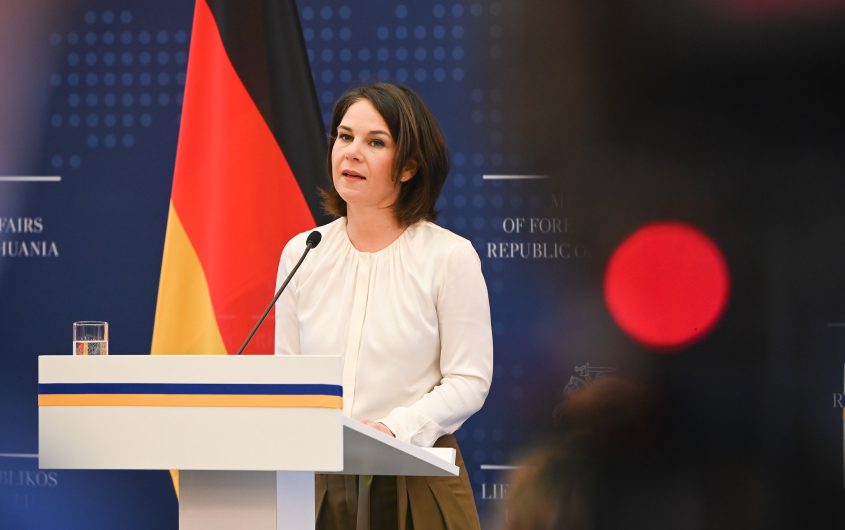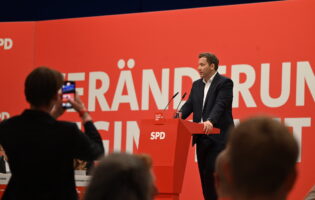
Lithuanian Ministry of Foreign Affairs via Flickr
No Vodka for Lunch

Christiane Lemke
Leibniz University Hannover
Christiane Lemke is Emerita Professor of Political Science and International Relations and former Director of the Jean Monnet European Center of Excellence at Leibniz University Hannover, Germany. She is also Adjunct Professor in the Political Science Department at UNC Chapel Hill. Her principal fields of interest are norm construction and change in international relations, with a particular focus on the European Union and transatlantic relations. She has held positions at Harvard University, New York University and Stanford University Berlin. She was also the first woman in Germany to serve as the director of the state parliament in Lower Saxony. Christiane Lemke is a member of the Alumni Board at Leibniz University Hannover, board member of the German Studies Association, and she is on the editorial board of German Politics and Society.
Germany’s Feminist Foreign Policy as Part of the Zeitenwende
Reports about German foreign minister Annalena Baerbock’s first visit to Moscow on January 18, 2022, recorded that she told Russian foreign minister Sergei Lavrov that she did not need vodka for lunch as a test of stamina, because she had given birth to two children, adding that 100,000 Russian soldiers at the border of Ukraine presented a vital threat and that the West would react accordingly.[1] This clear warning came right before Russia’s invasion of Ukraine and demonstrates her bold and principled approach to foreign policy.
A year after chancellor Olaf Scholz’s proclamation of the Zeitenwende, new guidelines for a feminist foreign policy add to the sweeping changes encountered in German politics. The guidelines, announced jointly by Baerbock and SPD-Development Minister, Svenja Schulze, emphasize the value-based approach prevalent in the SPD-Green-FDP government coalition. The goal is to increase women’s representation in external relations, to support the rights of women and children worldwide, and to dedicate resources to promoting equality of women and men. While this move did not come entirely unexpected since the coalition agreement of the “Ampel-Koalition” in 2021 already included a subchapter on feminist foreign policy, its proclamation in the middle of the brutal war on the European continent raises questions about its feasibility and chances of implementation. How effective can this policy be when security issues dominate the political agenda? What are the goals and which consequences follow for Germany’s position in global politics?
While Baerbock is certainly in favor of women’s representation and their rights, and she strongly supports a rules-based approach in external relations based on international law and human rights, her approach is principled but also more pragmatic.
To be sure, the concept of feminist foreign policy is not new. In fact, it has become a crucial strategy in international organizations, above all the United Nations, where UN-resolution 1325 adopted in the year 2000 called for a new strategy to protect the rights of women and girls worldwide, increase women’s representation in international organizations, and include women in peace negotiations, reparation settlements, and transitional justice processes. Following this resolution, several UN-member nations have implemented guidelines for an increasing inclusion of women in the realm of foreign policy and the strengthening of women’s rights globally. Swedish foreign minister Margot Wallström is credited with introducing the first encompassing policy guidelines for a new feminist foreign policy on the national level in 2014 and several countries followed suit, including Canada, Chile, France, Mexico, Spain, and now Germany.
This move, however, has sparked highly controversial debates in the German parliament and media even before the guidelines were published. While foreign minister Baerbock stressed that introducing a decisive concept to promote women’s rights is not a “revolution” but a self-evident move (Selbstverständlichkeit), the framing of the policy as “feminist” was quite controversial. For example, the Free Democrats, the smaller coalition partner, were so irritated that they insisted on using the English term rather than German in the coalition agreement.[2] Shortly thereafter, the leader of the center-right opposition party, Friedrich Merz (CDU), fiercely attacked feminist foreign policy in a parliamentary debate exclaiming that no money should ever be spent for this policy. It is reported that Minister Baerbock was not too happy about this term because of its ambiguity and ideological connotation.[3] While she is certainly in favor of women’s representation and their rights, and she strongly supports a rules-based approach in external relations based on international law and human rights, her approach is principled but also more pragmatic.
According to empirical studies, peace settlements including women prove to be more durable than those negotiated by men only. This finding could be crucial for a peace settlement in Ukraine. Women not only bear the brunt of taking care of children and the elderly during the war—the overwhelming majority of the more than one million Ukrainian refugees in Germany are women and children—but many of them also fight at the front to defend their country. There is no question that their representation in peace talks is essential. Another important feature is reporting on and following up on war crimes committed in Ukraine. Reports about the systematic rape of women and children in cities such as Bucha are already being chronicled so the perpetrators can be prosecuted. German political representatives, including the foreign minister, have supported these efforts calling for an international tribunal to investigate the gruesome war crimes, including rape as a weapon of war, and to bring perpetrators to justice. Baerbock was the first member of the German cabinet to travel to Bucha calling for an international investigation of Russian war crimes.
In relations with countries of the Global South which are in the jurisdiction of German development policy, many projects supporting the needs of women and girls and promoting women’s life chances, including their health and education, are already underway. In other cases, changes based on feminist foreign policy may be much harder to accomplish. What about those countries where women’s rights are openly rejected, such as Qatar, or, even more difficult, countries with clerical-patriarchal power structures such as Afghanistan, Iran, and Saudi-Arabia? How can German foreign policy support women’s modes of resistance to patriarchy in deeply traditional societies?
According to political convention, foreign policy primarily aims at promoting national interests. It is certainly one of the toughest policy fields in any government. In the German case, a combination of historically informed values, goals, and concepts have also played a major role in shaping external relations. The Ampel-coalition is no exception. With Annalena Baerbock in office, a new departure in foreign policy is marking the Zeitenwende. She is not only the first woman heading the foreign office, but she also has the stamina to make a difference and to promote the rights of women. Feminist foreign policy clearly indicates a new avenue with promising prospects, but its impact on external relations has yet to unfold.
[1] Anja Jardin, “Annalena Baerbock lotet ihre Macht aus,“ Neue Züricher Zeitung, 17 February 2023, p. 4.
[2] The text reads: „Gemeinsam mit unseren Partnern wollen wir im Sinne einer Feminist Foreign Policy Rechte, Ressourcen und Repräsentanz von Frauen und Mädchen weltweit stärken und gesellschaftliche Diversität fördern. Wir wollen mehr Frauen in internationale Führungspositionen entsenden, den Nationalen Aktionsplan zur Umsetzung der VN-Resolution 1325 ambitioniert umsetzen und weiterentwickeln.“ Koalitionsvertrag zwischen SPD, Bündnis 90/Die Grünen und FDP (2021), p. 144.
[3] See Anja Jardin, “Annalena Baerbock lotet ihre Macht aus,“ Neue Züricher Zeitung, 17 February 2023, p. 1, 4, 5.
 This article is part of the Society, Culture & Politics Program’s AGI 40th anniversary series.
This article is part of the Society, Culture & Politics Program’s AGI 40th anniversary series.









